Do you also randomly find yourself craving a new fantasy book series to lose yourself in, on the off-chance that it might turn into your next big obsession? Because we certainly do!
Fantasy, as a subgenre of literary fiction, has been around for quite a while now. The better part of a century, to be precise. But suppose you’re not particularly inclined to echo what snobs say about speculative storytelling and extend that definition to cover the real breadth of the subject matter. In that case, fantasy has existed for as long as people have.
Where once we would call on The Epic of Gilgamesh, or Homer’s Iliad, or The Poetic Edda to read humanity’s collective chronicle, this tradition is now being carried forward by authors who tap into the wellspring of their imagination to speak of worlds hitherto unseen, characters defiant against the calamity of their doom, and stories lost in the whirlpool of time.
The rise of High Fantasy literature in the mid-20th century, spurred by the enormous success of The Lord of the Rings, has led to the creation of hundreds of imaginary worlds and thousands of fantasy novels. But among all these innumerable tales of love and tragedy, only a few have reached the same heights as J.R.R. Tolkien’s timeless tale, let alone surpass it in quality.
So, gather ye around this imaginary hearth, and let us leaf through the pages of the speculative genre’s rich history to find works that not only build on that mountainous legacy but also subvert it in clever ways.
What follows are some of the best fantasy book series of all time, and your only thought by the end of this list will not be whether to pick up another fantasy series, but which of them to pick up first.

10. Discworld by Terry Pratchett
If you’re looking for a bit of light reading, or are fresh off a grimdark fantasy series and can’t possibly stomach any more of the gloomy stuff, then Discworld by Terry Pratchett is the story for you. Discworld is a book series that spends half of its time not taking itself seriously, and the other half making fun of cliché fantasy tropes. But don’t let Pratchett’s light and absurdist tone trick you into thinking that Discworld isn’t here to discuss important themes, even if it happens to take place on a flat, disc-shaped world resting on the backs of four giant elephants, who in turn are standing on a giant space turtle. Yes, you read that correctly. No, it’ll never get old, not even after reading the series in its entirety.
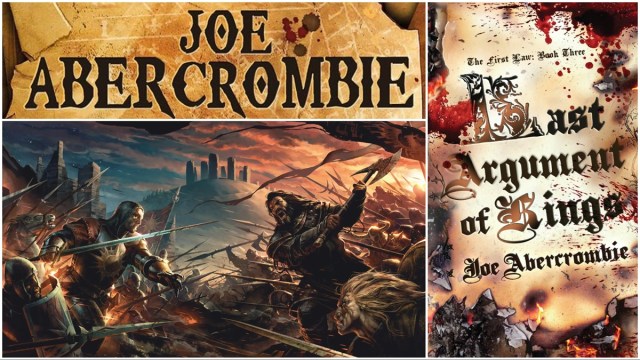
9. The First Law by Joe Abercrombie
There have been many attempts in history to subvert J.R.R. Tolkien by going in the opposite direction and doing exactly the reverse of everything he did with his work. As you’d expect, most of them have failed. But if there’s one person who can pull off that dark, gritty fantasy storytelling and not come off as an unoriginal try-hard, it’s the Lord Grimdark himself, Joe Abercrombie.
If you love Game of Thrones, you’re going to love The First Law trilogy as well. The story takes place in a world where the only rule is the rule of morally ambiguous, philosophically conflicted characters; a war-torn wasteland of a society that eerily and compellingly mirrors our world. And did I tell you about the prose? Joe Abercrombie is one of the greatest wordsmiths of our time, even if he himself is usually too humble to admit it.

8. The Earthsea Cycle by Ursula K. Le Guin
Speaking of great prose, The Earthsea Cycle by Ursula K. Le Guin definitely deserves a spot on this list, if for nothing besides the fact that it has influenced so many writers over the years. Le Guin is known for her brilliant character work and amazing, lyrical prose. The Earthsea Cycle is a must-read for every fantasy fan out there, as it inherits Tolkien’s legacy and bears it forward with a sense of reverence and simultaneous autonomy that few authors have managed to imitate over the decades. Another great thing about Earthsea is its reasonable length. If you’re not a fan of those chunky, 1000-page fantasy novels, then Le Guin’s narrative structure of mostly 200 to 300-page tales will not disappoint.

7. Malazan Book of the Fallen by Steven Erikson
As Erikson himself writes in the prelude to Malazan Book of the Fallen, this entire series has been written with only one question in mind: How ambitious can a fantasy author aspire to be before his own artistic volitions get in the way of a good time? Erikson’s fictional world is vicious, complex, and unforgiving. But Malazan is, above all else, challenging.
Those who’ve read through the 10-book behemoth describe it as a life-changing experience, but only if you fight your way through an uphill battle of confusion in the first three novels. Unlike most authors out there, Erikson doesn’t hold your hand. He thrusts you into the middle of his tale, trusting you to pick up the pieces of the puzzle as they move along. And while some may find that notion appealing, others are understandably put off by it. Still, there’s no denying that Malazan has a place in the High Fantasy Hall of Fame.

6. The Realm of the Elderlings by Robin Hobb
If you love fantasy and tragedy, then The Realm of the Elderlings by Robin Hobb is the perfect mixture of those two elements. Beginning with the acclaimed Farseer trilogy and taking place in the fictional Six Duchies, this story mostly revolves around a royal bastard called FitChivalry Farseer. It is also narrated in the first-person, with Fitz telling his story to an unspecified audience in the future. Hobb is a master of her craft, and her storytelling chops can give most fantasy authors a run for their money. And that’s not even to mention her brilliant prose.
But I’ll be honest with you; reading the Farseer trilogy left me broken, spiritually and emotionally. In fact, a part of me remains broken to this day thanks to Hobb, but I guess at the same time, the biggest commendation I could give her is that I don’t regret it one bit.
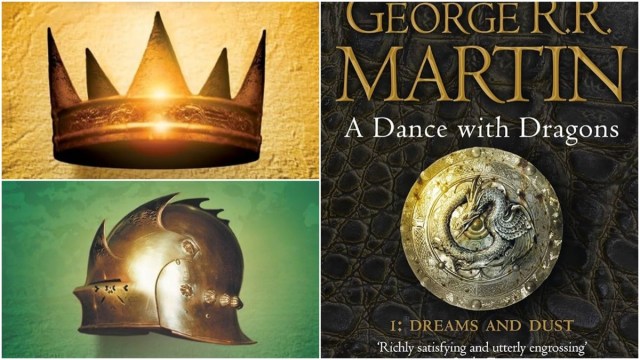
5. A Song of Ice and Fire by George R.R. Martin
It would not be an overstatement to suggest George R.R. Martin is the most influential High Fantasy writer after Tolkien. While A Song of Ice and Fire was mostly unheard of before the success of HBO’s Game of Thrones, those in the community had sung Martin’s praises for years, long before his books became a sensation in the public eye. Martin’s strength is in his ability to weave overtones of real-world history into his work, often citing the War of the Roses as a huge inspiration for the Seven Kingdoms of Westeros and all the in-fighting that takes place within it. If fantasy is still relevant in today’s landscape, we have George R.R. Martin to thank for it.
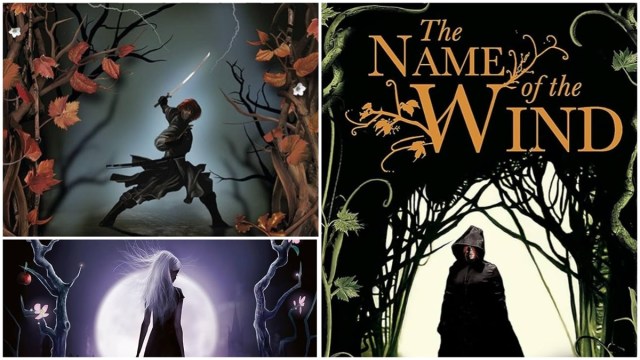
4. The Kingkiller Chronicle by Patrick Rothfuss
Poetic, inspirational, and intimate. The Kingkiller Chronicle is the tale of a burgeoning hero trying to make his way in a cruel and uncaring world. With nothing to help him but his own wits, Kvothe has to find a footing in society after his fate goes awry and his life gets upended on its head. We sit in a cozy inn in the middle of a town that is in the middle of nowhere, listening to the tale of a man who has fought with angels, befriended demons, and written songs that make minstrels weep. Now that man is merely a shadow of his former self, broken and forgotten after dooming the world in his folly. Need you a more compelling premise?
The Kingkiller Chronicle is one of the best works of fantasy literature in the past two decades. Patrick Rothfuss’ amazing storytelling chops, combined with his flowery and poetic prose, turn The Name of the Wind, the first book in the trilogy, and The Wise Man’s Fear, its sequel, into a majestic journey reminiscent of some of the greatest works of drama. The Tempest, Don Quixote, Cyrano de Bergerac; Patrick Rothfuss’ The Kingkiller Chronicle has it all.
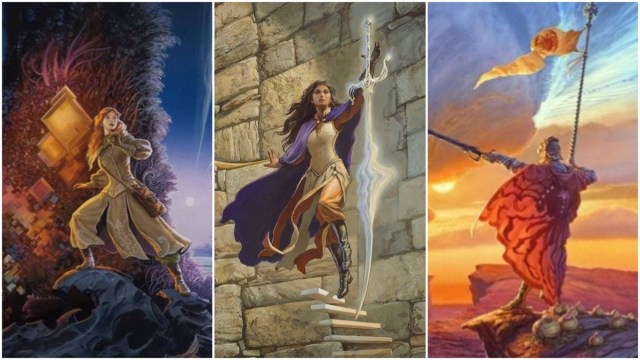
3. The Stormlight Archive by Brandon Sanderson
Having written dozens of books in less than two decades, Brandon Sanderson is probably the most prolific writer currently alive. Sanderson has gained acclaim for his amazing stories and outrageously brilliant ideas, not to mention for coming up with rich and detailed fictional worlds you could lose yourself in. And though he has a list of great novels to his name, it’s the planned 10-book saga titled The Stormlight Archivethat will become his crowning achievement in the future.
The Stormlight Archive is intricate, mysterious, and probably unlike anything you’ve read to this day. If you’re looking for an epic fantasy series with large-scale battles and conflicts, a host of chill-inducing character moments, and detailed, unique worldbuilding, then The Stormlight Archive is the book series to pick up. Just start on The Way of Kings and read a few chapters; before you know it, you’ll have reached the fourth and most recent release, The Rhythm of War. At least that’s how I remember the fevered days of binge-reading this series.
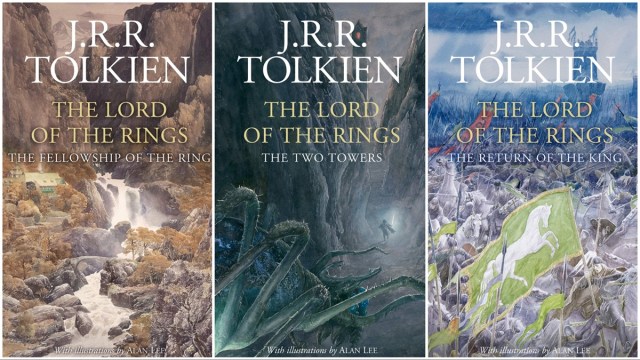
2. The Lord of the Rings by J.R.R. Tolkien
As I mentioned earlier, the entire genre traces its roots back to Tolkien, and it’s not without reason that the British linguist has often been referred to as the “father of High Fantasy.” I once heard another novelist describe Middle-earth’s legacy as “Mount Tolkien,” under whose long shadow reside most of the other prominent authors out there. But even Tolkien’s unavoidable reputation aside, Middle-earth (or Arda, the planet on which Middle-earth is found) remains one of the greatest feats of imaginative worldbuilding ever attempted.
The 10,000-year history of Middle-earth, the sheer breadth of its rich chronicle, and all the wonderful characters that have spun their heroics and tragedies within it, still hold their own against the rivals of this day and age. And frankly, even if its beats have been ripped off so many times that the story is now all too familiar even to those who know nothing about it, The Lord of the Rings remains a great tale of love, friendship, courage, honor, and camaraderie, unbowed by the weight of the multitudes of ideas and philosophies it tries to get across.

1. The Wheel of Time by Robert Jordan
Eulogizing Tolkien in the manner I did above, one would be forgiven for thinking that he should’ve made it to the top of this list. In fact, he probably would’ve been here, if not for an ambitious American author who, through the sweat and tears of his scholarly toil, ended up writing one of the greatest works of High Fantasy —nay, of fiction— in the world.
Robert Jordan’s The Wheel of Time is a 14-volume behemoth of a book series that took two decades, more than ten-thousand pages of prose, and two authors to tell in its entirety. That’s right; Jordan himself succumbed to illness before finishing the last novel, and the task befell Brandon Sanderson — then an up-and-comer of the genre — to finish what his literary hero had started many years ago.
The Wheel of Time is not just one of the most popular fantasy book series of all time; it is also the perfect bridge connecting J.R.R. Tolkien’s traditionalist tropes to Martin and Abercrombie’s new, grittier take. The Wheel of Time has a host of amazing characters, led by its timeless protagonist Rand al’Thor — who could very well be, as I’ve argued countless times, one of the best-written characters in the English canon. And while at first The Wheel of Time may come off as another spin on the “good vs. evil” tale that’s as old as time itself, Jordan will soon disabuse you of that mistaken notion, and show how he has intended his work to be a reflection of all of humanity and its story, time without end.
Zelda: Breath Of The Wild Makes A Grand Comeback In The UK Charts
Paradox Stats Guide – All Moves List
Bee Swarm Simulator Codes (October 2024)


